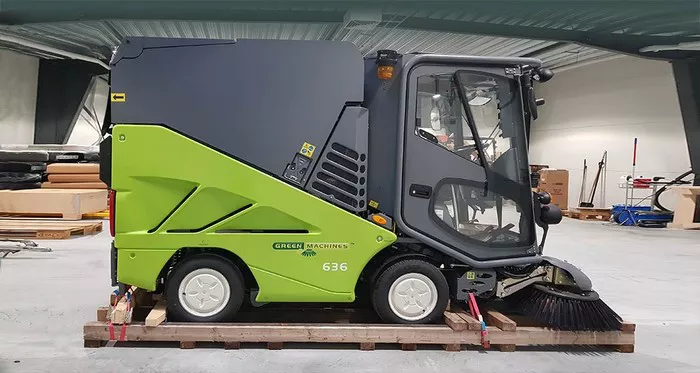Sweeper trucks are an indispensable asset in the realm of municipal and industrial cleaning operations. Whether it’s maintaining streets, parking lots, or industrial facilities, these specialized vehicles play a crucial role in keeping environments clean and safe. However, procuring a sweeper truck involves significant financial investment, and understanding the factors that influence their cost is essential for making informed decisions. In this guide, we delve into the intricacies of sweeper truck costs, focusing on mechanical broom sweepers and regenerative air sweepers.
Mechanical Broom Sweepers
Mechanical broom sweepers, also known as street sweepers, are a common sight in urban environments. These trucks feature rotating brushes that sweep debris and litter off streets and pavements, depositing them into a storage container for later disposal. Mechanical broom sweepers are ideal for general street cleaning and are particularly effective in removing larger debris such as leaves, gravel, and litter.
The cost of mechanical broom sweepers can vary depending on factors such as brand, size, capacity, and additional features. On average, a new mechanical broom sweeper can cost between $100,000 and $200,000. However, it’s essential to consider not only the initial purchase price but also long-term maintenance and operational costs. Investing in a high-quality sweeper truck from a reputable manufacturer can result in lower maintenance expenses and improved efficiency over its lifespan.
Regenerative Air Sweepers
Regenerative air sweepers utilize a different cleaning mechanism compared to mechanical broom sweepers. Instead of relying solely on brushes, these trucks employ a combination of high-velocity air and suction to dislodge and collect debris and dust particles from the surface. Regenerative air sweepers are highly effective in removing fine dust and particulate matter, making them suitable for urban environments with stringent cleanliness standards.
Similar to mechanical broom sweepers, the cost of regenerative air sweepers can vary based on factors such as size, capacity, and features. While regenerative air sweepers typically come at a higher price point compared to mechanical broom sweepers, their superior cleaning capabilities and efficiency can justify the investment for many municipalities and industrial facilities. Depending on the model and specifications, regenerative air sweepers can range from $150,000 to $300,000 or more.
Factors Influencing Sweeper Truck Costs
Several factors influence the cost of sweeper trucks, regardless of whether they are mechanical broom or regenerative air sweepers:
1. Size and Capacity: Larger sweeper trucks with higher capacity storage containers generally come at a higher price point due to increased materials and manufacturing costs.
2. Features and Technology: Advanced features such as GPS tracking, onboard cameras, automated controls, and emission control systems can add to the cost of sweeper trucks but may enhance operational efficiency and performance.
3. Brand and Reputation: Established brands with a proven track record of reliability and customer satisfaction often command higher prices for their sweeper trucks compared to lesser-known manufacturers.
4. Customization Options: Customization requests such as specialized brush configurations, water systems, or chassis modifications can increase the upfront cost of sweeper trucks but may be necessary to meet specific operational requirements.
5. Maintenance and Support: Consideration should also be given to the availability of spare parts, technical support, and warranty coverage, as these factors can impact the overall cost of ownership over the vehicle’s lifespan.
FAQs
Q1. What are the ongoing maintenance costs associated with sweeper trucks?
A1: Maintaining a sweeper truck involves regular servicing, inspection, and replacement of wear-and-tear components such as brushes, filters, hydraulic systems, and vacuum mechanisms. Depending on usage intensity and operating conditions, annual maintenance costs can range from $5,000 to $15,000 or more. It’s essential to follow manufacturer-recommended maintenance schedules and invest in quality parts to minimize downtime and prolong the lifespan of the sweeper truck.
Q2. Are there financing options available for purchasing sweeper trucks?
A2: Yes, many manufacturers and dealers offer financing options for sweeper trucks, allowing municipalities and businesses to spread out the cost over time through leasing or financing arrangements. Additionally, some government agencies may provide grants or low-interest loans for acquiring equipment aimed at improving environmental sustainability or public infrastructure. It’s advisable to explore various financing options and compare terms and interest rates to find the most suitable solution for your budget and requirements.
Q3. How can I optimize the efficiency of my sweeper truck to maximize its value?
A3: To optimize the efficiency of a sweeper truck and maximize its value, several strategies can be employed:
1. Regular Maintenance: Adhering to a proactive maintenance schedule can prevent costly breakdowns and ensure the sweeper truck operates at peak performance.
2. Training and Education: Providing comprehensive training for operators on proper equipment usage, maintenance procedures, and safety protocols can improve efficiency and reduce the risk of accidents or damage.
3. Route Planning: Utilizing route optimization software to plan efficient cleaning routes can minimize fuel consumption and labor costs while maximizing coverage and productivity.
4. Environmental Considerations: Implementing eco-friendly practices such as water recycling systems, alternative fuel options, and dust suppression techniques can reduce operating costs and environmental impact.
5. Performance Monitoring: Utilizing telematics and onboard diagnostics to monitor equipment performance and usage patterns can identify areas for improvement and optimize operational efficiency over time.
By incorporating these strategies into your sweeper truck management practices, you can enhance efficiency, reduce costs, and derive maximum value from your investment.
Conclusion
The cost of sweeper trucks varies depending on factors such as type, size, features, and brand. Mechanical broom sweepers and regenerative air sweepers each offer unique advantages and price points, catering to different cleaning requirements and budgets. Understanding the factors that influence sweeper truck costs and implementing strategies to optimize efficiency and value are essential for making informed purchasing decisions and achieving long-term success in municipal and industrial cleaning operations.

